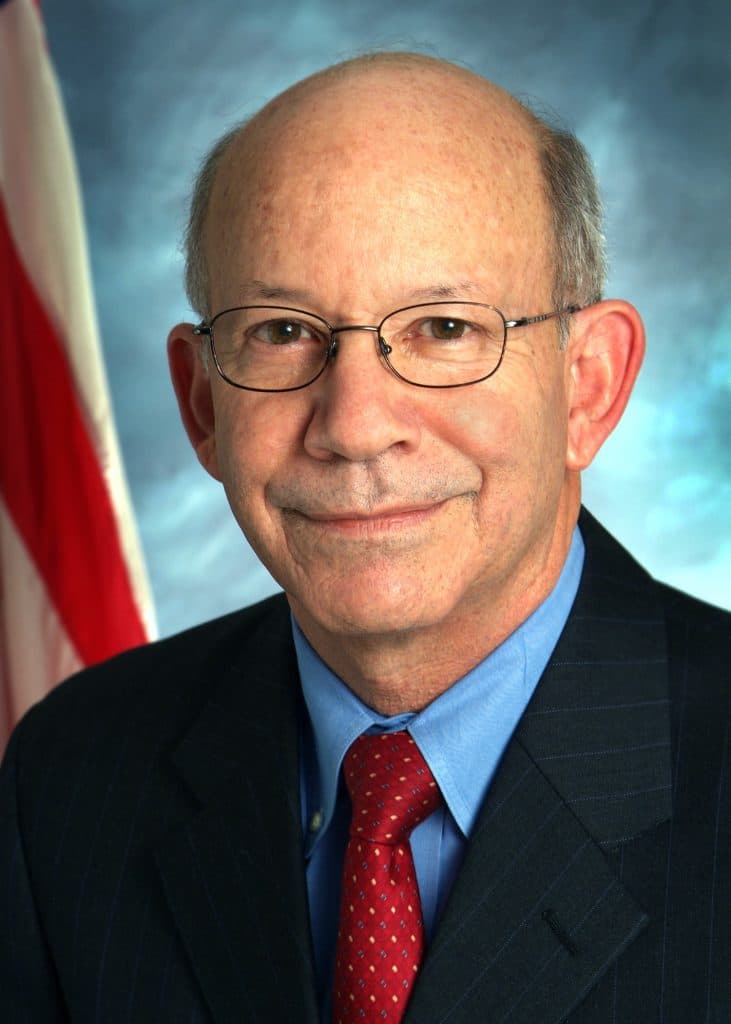A bill introduced by leaders in the U.S. House on Aug. 2 and endorsed by the SMART Transportation Division seeks to address complaints levied against the Class I rail carriers brought by customers and echoed by rail unions in hearings in the spring before the Surface Transportation Board (STB).
See a recap of that testimony here.
The Freight Rail Shipping Fair Market Act (H.R. 8649) reauthorizes the STB, the federal agency that oversees the economic regulation of freight rail in the country.
Among the bill’s purposes, according to a release from the U.S. House Transportation Committee:
- Strengthening STB’s authority to address rail service emergencies;
- Requiring rail contracts to include service delivery standards and remedies, while leaving details to be privately negotiated between parties;
- Providing STB with clear direction to resolve common carrier obligation complaints;
- Creating financial incentives for both railroads and their customers to efficiently move railcars;
- Supporting freight railroad efforts to identify where freight is located on their systems while in transit; and
- Adequately funding STB to allow for quicker dispute resolution when petitioned.
“I am proud to introduce the Freight Rail Shipping Fair Market Act with Chair DeFazio, Chair Scott, and Chair Costa to improve rail shipping nationwide,” Rail, Pipeline and Hazardous Materials Subcommittee Chair Donald M. Payne Jr. said. “The freight rail companies have focused on profits instead of performance and it has led to delays and problems in how we transport commodities to farms, factories, and stores across the country. My bill gives the Surface Transportation Board the power to prohibit rail rate increases during a rail emergency and resolve rail emergencies when they occur. This bill will improve the speed and reliability of rail service and guarantee that freight rail shipping continues to improve in the future without unnecessary regulations.”
On the heels of his testimony before the STB in April, SMART-TD President Jeremy Ferguson testified in June before Payne’s subcommittee discussing labor’s concerns with rail operating tactics under Precision Scheduled Railroading (PSR).
U.S. Rep. Peter DeFazio of Oregon, chair of the House Transportation and Infrastructure Committee, who was critical of the railroads’ PSR tactics in a May appearance before the rail subcommittee, lent his support to the legislation.
“I am pleased to join Chair Payne on the Freight Rail Shipping Fair Market Act, which will hold the freight rail industry accountable for their appalling service to shippers and ultimately help American families burdened by the increased price of goods,” DeFazio said. “It is imperative that our rail network is reliable, and yet consolidation and Wall Street pressures on railroads to cut costs and increase profits have made that near impossible. This bill will level the playing field and provide railroad customers—many of which are transporting key food and energy products—the service they deserve. This bill will also provide the tools and guidance the Surface Transportation Board needs to fulfill its mandate and better regulate disputes among Class I railroads and their customers, weed out unfair practices, and incentivize efficient operations. I look forward to putting these policies into action, empowering the Board, and boosting competition in the freight rail industry.”
“Whether carrying inputs to our farmers or moving their products to market, rail is a vital tool in the American agriculture industry. This fact has become increasingly apparent as rail service issues have created challenges for our farmers, grain elevators, and ethanol producers and resulted in increased costs for producers and consumers alike,” Agriculture Chair David Scott said. “I want to thank Chair DeFazio and Chair Payne for their work on this legislation, particularly their work with the agriculture community to address their concerns. I am proud to join as an original cosponsor of the Freight Rail Shipping Fair Market Act.”
“The pandemic has wreaked havoc on every segment of our economy. It has disrupted our supply chain, both in terms of imports and exports and has put our agricultural community at great risk. The time is now to sit down with rail carriers to fix this broken supply chain system. I support this legislation to improve freight rail service, reduce inflation, and ensure our shippers and suppliers are confident in the ability of our nation’s rail system to efficiently move goods and services. This is the only way to give consumers confidence in fair pricing and consistent access to products in grocery stores and on shelves,” House Subcommittee on Livestock and Foreign Agriculture Chair Jim Costa said.
To better understand why rail service delivery problems persist, the Railroad Subcommittee held hearings in March and in May 2022, and the Surface Transportation Board held a hearing on urgent issues in freight rail service in late April 2022. All three hearings documented serious problems in the freight rail industry stemming from years of Wall Street focus on increasing railroad operating profits to allow for stock buybacks and dividends, rather than investing those profits in expanding critical freight rail service to more places and serving more industries. Despite these hearings and actions undertaken by the Surface Transportation Board, severe service issues continue to hamstring rail shipments across the country. This bill seeks to stem that tide.
Captured freight rail customers who stand to benefit from provisions in H.R. 8649 have signed on to support the Freight Rail Shipping Fair Market Act. They include:
- Agribusiness Association of Iowa
- Agribusiness Council of Indiana
- Agricultural Council of Arkansas
- Agricultural Retailers Association
- AgTC — Agriculture Transportation Coalition
- Amcot
- American Agri-Women
- American Bakers Association
- American Chemistry Council (ACC):
- American Cotton Producers
- American Cotton Shippers Association
- American Farm Bureau Federation
- American Feed Industry Association
- American Sheep Industry Association
- American Soybean Association
- American Sugar Cane League
- Arkansas Rice Federation
- Association of California Egg Farmers
- California Association of Wheat Growers
- California Cattlemen’s Association
- California Grain and Feed Association
- California Pork Producers Association
- California Poultry Federation
- Consumer Brands Association
- Corn Refiners Association
- Cottonseed and Feed Association
- Freight Rail Customer Alliance
- Georgia Agribusiness Council
- Grain and Feed Association of Illinois
- Growth Energy
- International Dairy Foods Association
- International Fresh Produce Association
- Iowa Institute for Cooperatives
- Kansas Association of Wheat Growers
- Kansas Grain and Feed Association
- Kansas Agribusiness Retailers Association
- Laughlin Cartrell Inc.
- Midsouth Grain Association
- Minnesota Crop Production Retailers
- Minnesota Grain and Feed Association
- Minnesota Wheat Research & Promotion Council
- Mississippi Feed and Grain Association
- Montana Agricultural Business Association
- Montana Grain Elevators Association
- National Aquaculture Association
- National Association of State Departments of Agriculture
- National Association of Wheat Growers
- National Cattlemen’s Beef Association
- National Corn Growers Association
- National Cotton Council of America
- National Cotton Ginners Association
- National Cottonseed Products Association
- National Council of Farmer Cooperatives
- National Grain and Feed Association
- National Grange
- National Industrial Transportation League
- National Milk Producers Federation
- National Oilseed Processors Association
- National Sorghum Producers
- Nebraska Agri-Business Association
- Nebraska Cooperative Council
- Nebraska Dry Pea and Lentil Commission
- Nebraska Wheat Board
- Nebraska Wheat Growers Association
- New York State Agribusiness Association
- North American Meat Institute
- North American Millers’ Association
- North Carolina Agribusiness Council
- North Dakota Grain Dealers Association
- Northeast Agribusiness and Feed Alliance
- Northwest Chicken Council
- Ohio AgriBusiness Association
- Oklahoma Grain & Feed Association
- Oklahoma Wheat Growers Association
- Oregon Feed & Grain Association
- Oregon Wheat Growers League
- Pacific Egg & Poultry Association
- Pacific Northwest Grain & Feed Association
- Pet Food Institute
- Plains Cotton Growers, Inc.
- Portland Cement Association
- Private Railcar Food and Beverage Association
- Roquette
- South Dakota Agri-Business Association (SDABA)
- Soy Transportation Coalition
- Specialty Soya and Grains Alliance
- Tennessee Feed and Grain Association
- Texas Ag Industries Association
- Texas Grain and Feed Association
- Texas Wheat Producers Association
- The Fertilizer Institute
- USA Rice
- Wisconsin Agri-Business Association
- Wyoming Wheat Marketing Commission
The full bill text and a fact sheet are available by following the links.


